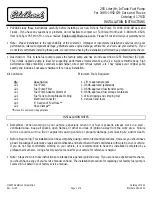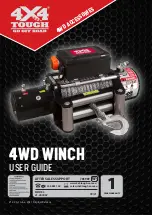
Whenever a change is noticed in the sound of the exhaust
system, when exhaust fumes can be detected inside the
vehicle, or when the underside or rear of the vehicle is
damaged, have a competent mechanic inspect the com-
plete exhaust system and adjacent body areas for broken,
damaged, deteriorated, or mispositioned parts. Open
seams or loose connections could permit exhaust fumes
to seep into the passenger compartment. In addition,
inspect the exhaust system each time the vehicle is raised
for lubrication or oil change. Replace as required.
Safety Checks You Should Make Inside The
Vehicle
Seat Belts
Inspect the seat belt system periodically, checking for
cuts, frays, and loose parts. Damaged parts must be
replaced immediately. Do not disassemble or modify the
system.
Front seat belt assemblies must be replaced after a
collision. Rear seat belt assemblies must be replaced after
a collision if they have been damaged (i.e., bent retractor,
torn webbing, etc.). If there is any question regarding seat
belt or retractor condition, replace the seat belt.
Air Bag Warning Light
The Air Bag warning light
will turn on for four to
eight seconds as a bulb check when the ignition is first
placed in the ON/RUN position. If the light is either
not on during starting, stays on, or turns on while
driving, have the system inspected at an authorized
dealer as soon as possible. This light will illuminate
with a single chime when a fault with the Air Bag
Warning Light has been detected, it will stay on until
the fault is cleared. If the light comes on intermittently
or remains on while driving, have an authorized
dealer service the vehicle immediately. Refer to “Oc-
cupant Restraints” for further information.
114
THINGS TO KNOW BEFORE STARTING YOUR VEHICLE
Summary of Contents for 2016 Dart
Page 4: ......
Page 7: ...1 INTRODUCTION 5 ...
Page 10: ......
Page 77: ...Not Seated Properly Not Seated Properly 2 THINGS TO KNOW BEFORE STARTING YOUR VEHICLE 75 ...
Page 162: ...160 UNDERSTANDING THE FEATURES OF YOUR VEHICLE ...
Page 163: ...3 UNDERSTANDING THE FEATURES OF YOUR VEHICLE 161 ...
Page 164: ...162 UNDERSTANDING THE FEATURES OF YOUR VEHICLE ...
Page 201: ...Voice Tree 3 UNDERSTANDING THE FEATURES OF YOUR VEHICLE 199 ...
Page 216: ...Voice Tree 214 UNDERSTANDING THE FEATURES OF YOUR VEHICLE ...
Page 218: ...216 UNDERSTANDING THE FEATURES OF YOUR VEHICLE ...
Page 220: ...218 UNDERSTANDING THE FEATURES OF YOUR VEHICLE ...
Page 222: ...220 UNDERSTANDING THE FEATURES OF YOUR VEHICLE ...
Page 224: ...222 UNDERSTANDING THE FEATURES OF YOUR VEHICLE ...
Page 266: ...One Half Second Tone Slow Tone 264 UNDERSTANDING THE FEATURES OF YOUR VEHICLE ...
Page 267: ...Slow Tone Fast Tone 3 UNDERSTANDING THE FEATURES OF YOUR VEHICLE 265 ...
Page 268: ...Fast Tone Fast Tone 266 UNDERSTANDING THE FEATURES OF YOUR VEHICLE ...
Page 306: ......
Page 423: ...Operating Tips Chart 4 UNDERSTANDING YOUR INSTRUMENT PANEL 421 ...
Page 424: ......
Page 494: ...492 STARTING AND OPERATING ...
Page 586: ......
Page 647: ...MAINTENANCE SCHEDULES CONTENTS 䡵 MAINTENANCE SCHEDULE 646 Required Maintenance 647 8 ...
Page 654: ......
Page 666: ......
Page 667: ...INDEX 10 ...
















































